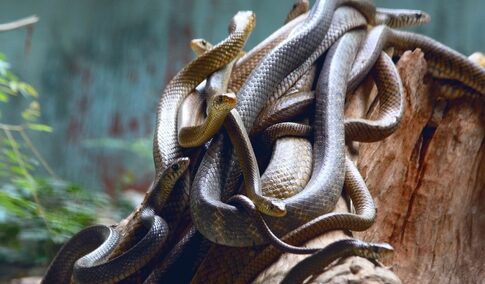No, there isn’t a Democrat on the loose in this story. On June 10th, four large reticulated pythons were found abandoned in the Twigmoor and Cleatham areas of Lincolnshire. Although three pythons—two albinos and a rare Pied Golden Child Morph—have been apprehended, one might still be out there. Reticulated pythons are the longest snake species in the world; one that was caught was estimated to be eighteen feet long.
Abandoned Exotic Predators Found in Rural England
Humberside Police are investigating after four large reticulated pythons were abandoned in the Lincolnshire countryside. The exotic snakes, which are not native to the United Kingdom, were discovered in the Twigmoor and Cleatham areas on June 10th. Three of the reptiles have been successfully captured with assistance from exotic animal experts, but authorities believe one python may still be at large. These non-venomous constrictors, which can grow to become the world’s longest snake species, appear to have been discarded pets, raising serious concerns about irresponsible exotic animal ownership.
The abandoned collection included several rare and valuable specimens, indicating they were likely bred in captivity as part of the exotic pet trade. Two albino pythons and a distinctive Pied Golden Child Morph were among those recovered, along with a “wild type” python estimated to measure approximately 18 feet in length. Native to South and Southeast Asia, these massive constrictors are popular among exotic pet enthusiasts but require specialized care and housing that some owners may find challenging to maintain as the animals grow to their full size.
Four HUGE python snakes let lose in Lincolnshire – here are the ITV Calendar breakfast headlines you're waking up to. pic.twitter.com/z9CtGiypRy
— Victoria Whittam (@vicwhittamITV) June 16, 2025
Public Safety Concerns While Search Continues
While police emphasize that these snakes pose limited risk to humans, they are urging the public to exercise caution and report any sightings immediately. “These snakes will not attack you,” a force spokesman explained. “They will only try to defend themselves if they feel threatened.” Nevertheless, authorities strongly advise against approaching any loose pythons discovered in the area. The constrictors kill their prey through powerful squeezing rather than venom, making them potentially dangerous to small animals and pets.
“If you have a pet that you can no longer keep, please take it to an exotic animal shop or animal rescue,” a force spokesman said. “Do not release them into the wild.”
Dog owners in the Twigmoor and Cleatham areas have been specifically instructed to keep their pets on leashes until all pythons are accounted for. While these snakes would typically target smaller prey in their natural habitat, they could view unleashed dogs as potential threats or prey items. The rural task force is taking the situation seriously, as introducing non-native predators into the British ecosystem could have significant environmental impacts beyond the immediate safety concerns.
Exotic snakes abandoned in North Lincolnshire https://t.co/vMC8MQmXGB
— Mike Otley (@MikeOtley) June 16, 2025
Investigation Underway as Authorities Seek Information
The Humberside Police Rural Task Force is investigating potential offenses under the Wildlife and Countryside Act 1981, which prohibits the release of non-native species into the wild. Releasing exotic animals is not only cruel to the animals themselves, which are ill-equipped to survive in British conditions, but can also disrupt local ecosystems and threaten native wildlife. Reticulated pythons require tropical environments to thrive, making their survival in the wild unlikely in England’s temperate climate, especially as temperatures cool.
Police are seeking information from anyone who might know about the circumstances surrounding the abandonment of these valuable reptiles. The distinctive coloration and patterns of the recovered pythons suggest they were specially bred specimens with significant monetary value in the exotic pet trade. Authorities have provided multiple contact options for tips, including emailing [email protected] or calling 101 with reference 25000081788. The investigation aims to determine who owned these animals and why they chose to abandon them rather than surrendering them to appropriate facilities.
This incident highlights growing concerns about exotic pet ownership in Britain, where regulations permit keeping certain non-native species but require responsible management and care. Experts warn that impulse purchases of exotic animals often lead to abandonment when owners realize the significant commitment required for their proper care and housing. Responsible exotic pet owners are encouraged to work with legitimate rescue organizations rather than releasing animals when they can no longer provide appropriate care.

